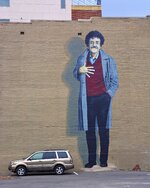Mr Moore
Well-Known Member
February 2024
Despite the shorter month, I managed to get quite a few in due to a few sleepless nights and several of the books being quite concise.
Book 8: Michael Chabon - Kavalier & Clay
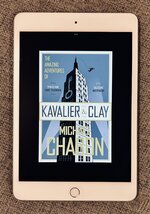
I enjoyed this one although probably not as much as I expected to given both the critical and general acclaim it has received. The first segment of the book I found mind-numbingly slow and frankly a little bit silly but, once that was done with and the story kicked off in earnest I really found myself drawn in to these characters and their combined history. Good stuff and very much worth the effort, even though it did sometimes feel like Chabon was getting paid by the word in his meandering sidelines that all too often did little to flesh out characters or events, rather detracting from the focus of the plot thread momentarily.
Book 9: Tracy Chevalier - Girl With a Pearl Earring
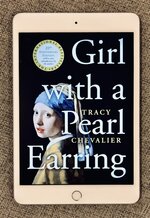
Another one of Mrs Moore’s long-time recommendations, this came up just before new year when we visited Bristol for a few days. As it was the first time visiting the city for all of us, we used Banksy’s scattered artworks as a way of walking around the city and taking it all in. When we came across his Girl With the Pierced Eardrum, I was reminded to add this book to my to-read collection for 2024. And I loved it. It’s a really smart way of using fiction to add flesh to an image so ubiquitous but with so little recorded information to fall back on. The writing is smashing, it’s really steadily paced, lending an almost gothic, tense atmosphere to the proceedings. Wonderful, worthy of all its popularity. And here's the Banksy that favours an in situ fire alarm over Vermeer's pearl:
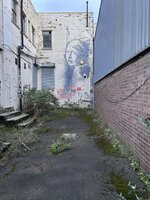
Book 10: Paul Auster - In the Country of Last Things
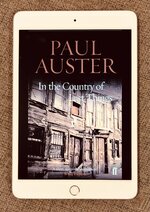
This has definitely been my least favourite Auster read so far. The story of a young woman going to a dystopian city where her brother before her had travelled and never returned seems straightforward enough as a genre piece. But Auster weaves in not only the ever increasing absence of objects, physical things that no longer exist, but also the words to describe them and even the ability to remember and think about them. Whilst the story of Anna and the relatively small cast of characters around her develop, it seemed to me that Auster kept returning to how the mechanics of this dystopia operated - or often no longer operated - and for a small novel it felt remarkably bloated because of this.
Book 11: Jamaica Kincaid - Annie John
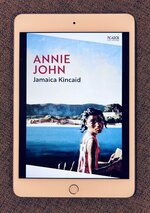
Really excellent book depicting the teen years of an Antiguan girl and how she slowly drifts apart from the mother who she idolises in her younger life. Annie John is a highly intelligent girl who like many under-stimulated children, finds herself getting into trouble both in and out of school. But, it's more than that: from her early descriptions of her obsession with death, living within eyeshot of a cemetery, to a bubbling depression that I found reminiscent of Sylvia Plath's Esther Greenwood. While Esther described feeling like she was trapped beneath a bell jar, Annie details the feeling of a black ball coated in cobwebs in her stomach. The book touches on the clash between modern medicine and traditional Afro/Caribbean Obeah beliefs when dealing with one of Annie's bouts of illness along with colonialism and migration. I got through this in a day and a half, it's really compelling and I'd happily recommend it.
Book 12: Alan Moore & Dave Gibbons - Watchmen
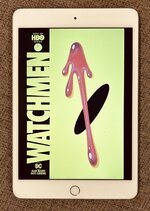
Very good, a bit silly I suppose but comics are aren't they. The cold war setting seems fairly relevant again now. We could all wish for a few heroes to bring the world together again although, whether you'd want to sacrifice New York is up for debate!
Book 13: Fran Ross - Oreo
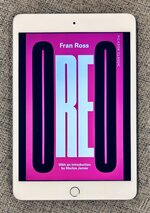
Absolute stonker of a book full of brave comedy and satire that plays with black slang, Yiddish, a sprinkling of Latin - all wrapped up in a retelling of a Greek myth. For as much as I laughed at this book, I'm absolutely certain that there's tons of stuff that I didn't appreciate both culturally and intellectually - it really is smart as hell but not to the point of feeling condescending. Amazingly, it's the only book Ross every wrote in her short life and was largely ignored at the time until a rediscovery a few years back. Well worth your time if you like smart, challenging and funny storytelling.
Book 14: John Steinbeck - Of Mice and Men
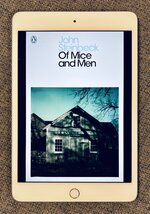
I'm certain that I read this in secondary school when I was about 13 but I honestly couldn't remember much about it. I loved it this time around. It's short but fits so much of value into the limited text. The story of a friendship between two men is timeless. The way the book captures the hardships of the manual labourer is fleeting but stark. I've admittedly become quite sentimental in my later years and the conclusion brought me as close to tears as I think any book ever has but, that reaction seems intentional from Steinbeck I think and if you don't care for sentimentality then it possibly won't appeal.
Book 15: Curtis Sittenfeld - Rodham
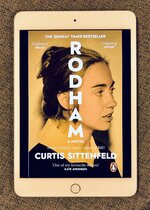
Superb but very odd book. Reading like an autobiography, it tells the story of what would happen had Hillary Rodham never married Bill Clinton. The first third of the book very much leads you through their courtship and joint aspirations when abruptly, they call it a day! The rest of the book tells how Hillary goes on to seek out her own life in politics. It's a bold novel that I'm amazed quite frankly doesn't cross some legal boundaries but, I guess as it's clear in it's positioning as a work of fiction that just happens to blend in real life people, places and events, it skates on the safe side of libel.
Despite the shorter month, I managed to get quite a few in due to a few sleepless nights and several of the books being quite concise.
Book 8: Michael Chabon - Kavalier & Clay

I enjoyed this one although probably not as much as I expected to given both the critical and general acclaim it has received. The first segment of the book I found mind-numbingly slow and frankly a little bit silly but, once that was done with and the story kicked off in earnest I really found myself drawn in to these characters and their combined history. Good stuff and very much worth the effort, even though it did sometimes feel like Chabon was getting paid by the word in his meandering sidelines that all too often did little to flesh out characters or events, rather detracting from the focus of the plot thread momentarily.
Book 9: Tracy Chevalier - Girl With a Pearl Earring

Another one of Mrs Moore’s long-time recommendations, this came up just before new year when we visited Bristol for a few days. As it was the first time visiting the city for all of us, we used Banksy’s scattered artworks as a way of walking around the city and taking it all in. When we came across his Girl With the Pierced Eardrum, I was reminded to add this book to my to-read collection for 2024. And I loved it. It’s a really smart way of using fiction to add flesh to an image so ubiquitous but with so little recorded information to fall back on. The writing is smashing, it’s really steadily paced, lending an almost gothic, tense atmosphere to the proceedings. Wonderful, worthy of all its popularity. And here's the Banksy that favours an in situ fire alarm over Vermeer's pearl:

Book 10: Paul Auster - In the Country of Last Things

This has definitely been my least favourite Auster read so far. The story of a young woman going to a dystopian city where her brother before her had travelled and never returned seems straightforward enough as a genre piece. But Auster weaves in not only the ever increasing absence of objects, physical things that no longer exist, but also the words to describe them and even the ability to remember and think about them. Whilst the story of Anna and the relatively small cast of characters around her develop, it seemed to me that Auster kept returning to how the mechanics of this dystopia operated - or often no longer operated - and for a small novel it felt remarkably bloated because of this.
Book 11: Jamaica Kincaid - Annie John

Really excellent book depicting the teen years of an Antiguan girl and how she slowly drifts apart from the mother who she idolises in her younger life. Annie John is a highly intelligent girl who like many under-stimulated children, finds herself getting into trouble both in and out of school. But, it's more than that: from her early descriptions of her obsession with death, living within eyeshot of a cemetery, to a bubbling depression that I found reminiscent of Sylvia Plath's Esther Greenwood. While Esther described feeling like she was trapped beneath a bell jar, Annie details the feeling of a black ball coated in cobwebs in her stomach. The book touches on the clash between modern medicine and traditional Afro/Caribbean Obeah beliefs when dealing with one of Annie's bouts of illness along with colonialism and migration. I got through this in a day and a half, it's really compelling and I'd happily recommend it.
Book 12: Alan Moore & Dave Gibbons - Watchmen

Very good, a bit silly I suppose but comics are aren't they. The cold war setting seems fairly relevant again now. We could all wish for a few heroes to bring the world together again although, whether you'd want to sacrifice New York is up for debate!
Book 13: Fran Ross - Oreo

Absolute stonker of a book full of brave comedy and satire that plays with black slang, Yiddish, a sprinkling of Latin - all wrapped up in a retelling of a Greek myth. For as much as I laughed at this book, I'm absolutely certain that there's tons of stuff that I didn't appreciate both culturally and intellectually - it really is smart as hell but not to the point of feeling condescending. Amazingly, it's the only book Ross every wrote in her short life and was largely ignored at the time until a rediscovery a few years back. Well worth your time if you like smart, challenging and funny storytelling.
Book 14: John Steinbeck - Of Mice and Men

I'm certain that I read this in secondary school when I was about 13 but I honestly couldn't remember much about it. I loved it this time around. It's short but fits so much of value into the limited text. The story of a friendship between two men is timeless. The way the book captures the hardships of the manual labourer is fleeting but stark. I've admittedly become quite sentimental in my later years and the conclusion brought me as close to tears as I think any book ever has but, that reaction seems intentional from Steinbeck I think and if you don't care for sentimentality then it possibly won't appeal.
Book 15: Curtis Sittenfeld - Rodham

Superb but very odd book. Reading like an autobiography, it tells the story of what would happen had Hillary Rodham never married Bill Clinton. The first third of the book very much leads you through their courtship and joint aspirations when abruptly, they call it a day! The rest of the book tells how Hillary goes on to seek out her own life in politics. It's a bold novel that I'm amazed quite frankly doesn't cross some legal boundaries but, I guess as it's clear in it's positioning as a work of fiction that just happens to blend in real life people, places and events, it skates on the safe side of libel.
